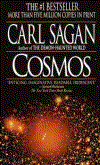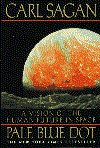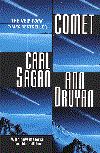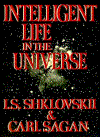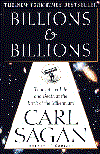|
Click-On Any One Of Carl Sagan's Books To Order
|
Quotes
and Books by Carl Sagan
Quotes and Books by Carl Sagan
"Carl [Sagan] never wanted to believe. He wanted to know." --Ann Druyan Science and Religion "In many cultures it is customary to answer that God created the universe out of nothing. But this is mere temporizing. If we wish courageously to pursue the question, we must, of course ask next where God comes from. And if we decide this to be unanswerable, why not save a step and decide that the origin of the universe is an unanswerable question? Or, if we say that God has always existed, why not save a step and conclude that the universe has always existed?" --Cosmos p.257 "What do you do when you are faced with several different gods each claiming the same territory? The Babylonian Marduk and the Greek Zeus was each considered master of the sky and king of the gods. You might decide that Marduk and Zeus were really the same. You might also decide, since they had quite different attributes, that one of them was merely invented by the priests. But if one, why not both? And so it was that the great idea arose, the realization that there might be a way to know the world without the god hypothesis...." --Cosmos p.175-176 "If you want to know when the next eclipse of the Sun will be, you might try magicians or mystics, but you'll do much better with scientists." --The Demon-Haunted World p.30 "Heroes who try to explain the world in terms of matter and energy may have arisen many times in many cultures, only to be obliterated by the priests and philosophers in charge of the conventional wisdom..." --The Demon-Haunted World World p.310 "As we learn more and more about the universe, there seems less and less for God to do.... When Newton explained the motion of the planets by the universal theory of gravitation, it no longer was necessary for angels to push and pummel the planets about. When Pierre Simon, the Marquis de Laplace, proposed to explain the origin of the solar system--although not the origin of matter--in terms of physical laws as well, even the necessity for a god involved in the origins of things seemed profoundly challenged." --Broca's Brain p.335-336 "Those afraid of the universe as it really is, those who pretend to nonexistent knowledge and envision a Cosmos centered on human beings will prefer the fleeting comforts of superstition. They avoid rather than confront the world. But those with the courage to explore the weave and structure of the Cosmos, even where it differs profoundly from their wishes and prejudices, will penetrate its deepest mysteries." --Cosmos p.333 "Religions contradict one another--on small matters, such as whether we should put on a hat or take one off on entering a house of worship, or whether we should eat beef and eschew pork or the other way around, all the way to the most central issues, such as whether there are no gods, one God, or many gods." --Pale Blue Dot p.51 "If you lived two or three millennia ago, there was no shame in holding that the Universe was made for us. It was an appealing thesis consistent with everything we knew; it was what the most learned among us taught without qualification. But we have found out much since then. Defending such a position today amounts to willful disregard of the evidence, and a flight from self-knowledge." --Pale Blue Dot p.52 "Once we overcome our fear of being tiny, we find ourselves on the threshold of a vast and awesome Universe that utterly dwarfs--in time, in space, and in potential--the tidy anthropocentric proscenium of our ancestors. We gaze across billions of light-years of space to view the Universe shortly after the Big Bang, and plumb the fine structure of matter. We peer down into the core of our planet, and the blazing interior of our star. We read the genetic language in which is written the diverse skills and propensities of every being on Earth. We uncover hidden chapters in the record of our origins, and with some anguish better understand our nature and prospects. We invent and refine agriculture, without which almost all of us would starve to death. We create medicines and vaccines that save the lives of billions. We communicate at the speed of light, and whip around the Earth in an hour and a half. We have sent dozens of ships to more than seventy worlds, and four spacecraft to the stars. We are right to rejoice in our accomplishments, to be proud that our species has been able to see so far, and to judge our merit in part by the very science that has so deflated our pretensions." --Pale Blue Dot p.53-54 Science and Civilization "The very method of mathematical reasoning that Isaac Newton introduced to explain the motion of the planets around the Sun has led to most of the technology of our modern world. The Industrial Revolution, for all its shortcomings, is still the global model of how an agricultural nation can emerge from poverty. These debates have bread-and-butter consequences." --Pale Blue Dot p.56 Science and Beauty "It is sometimes said that scientists are unromantic, that their passion to figure out robs the world of beauty and mystery. But is it not stirring to understand how the world actually works--that white light is made of colors, that color is the way we perceive the wavelengths of light, that transparent air reflects light, that in so doing it discriminates among the waves, and that the sky is blue for the same reason that the sunset is red? It does no harm to the romance of the sunset to know a little bit about it." --Pale Blue Dot p.159-160 Science and Survival "Who discovered that CFCs [chlorofluorocarbons] posed a threat to the ozone layer? Was it the principal manufacturer, the DuPont Corporation, exercising corporate responsibility? Was it the Environmental Protection Agency protecting us? Was it the Department of Defense defending us? No, it was two ivory-tower, white-coated university scientists working on something else--Sherwood Rowland and Mario Molina of the University of California, Irvine. Not even an Ivy League university. No one instructed them to look for dangers to the environment. They were pursuing fundamental research. They were scientists following their own interests. Their names should be known to every schoolchild." --Pale Blue Dot p.221-222 "Many of the dangers we face indeed arise from science and technology--but, more fundamentally, because we have become powerful without becoming commensurately wise. The world-altering powers that technology has delivered into our hands now require a degree of consideration and foresight that has never before been asked of us." --Pale Blue Dot p.384 Politics and Religion "Emerging from a particularly credulous Southern California culture, Nancy and Ronald Reagan relied on an astrologer in private and public matters--unknown to the voting public. Some portion of the decision-making that influences the future of our civilization is plainly in the hands of charlatans." --The Demon-Haunted World p.199 "In Italy, the Inquisition was condemning people to death until the end of the eighteenth century, and inquisitional torture was not abolished in the Catholic Church until 1816. The last bastion of support for the reality of witchcraft and the necessity of punishment has been the Christian churches." --The Demon-Haunted World p.413 "In 1993, the supreme religious authority of Saudi Arabia, Sheik Abdel-Aziz Ibn Baaz, issued an edict, or fatwa, declaring that the world is flat. Anyone of the round persuasion does not believe in God and should be punished. Among many ironies, the lucid evidence that the Earth is a sphere, accumulated by the second century Graeco-Egyptian astronomer Claudius Ptolemaeus, was transmitted to the West by astronomers who were Muslim and Arab. In the ninth century, they named Ptolemy's book in which the sphericity of the Earth is demonstrated, the Almagest, 'The Greatest.'" --The Demon-Haunted World p.325 "It took the Church until 1832 to remove Galileo's work from its list of books which Catholics were forbidden to read at the risk of dire punishment of their immoral souls." --Pale Blue Dot p.43 Contemporary Issues "Handguns are available for self protection in Seattle, but not in nearby Vancouver, Canada; handgun killings are five times more common and the handgun suicide rate is ten times greater in Seattle. Guns make impulsive killing easy." --The Demon-Haunted World p.423 "...children with special abilities and skills need to be nourished and encouraged. They are a national treasure. Challenging programs for the 'gifted' are sometimes decried as 'elitism.' Why aren't intensive practice sessions for varsity football, baseball, and basketball players and interschool competition deemed elitism? After all, only the most gifted athletes participate. There is a self-defeating double standard at work here, nationwide." --The Demon-Haunted World p.345 Free Inquiry "When permitted to listen to alternative opinions and engage in substantive debate, people have been known to change their minds. It can happen. For example, Hugo Black, in his youth, was a member of the Ku Klux Klan; he later became a Supreme Court justice and was one of the leaders in the historic Supreme Court decisions, partly based on the 14th Amendment to the Constitution, that affirmed the civil rights of all Americans: It was said that when he was a young man he dressed up in white robes and scared black folks; when he got older, he dressed up in black robes and scared white folks." --The Demon-Haunted World p.431 "Real patriots ask questions." --The Demon-Haunted World p.421 The Fate of the Human Species "In our tenure on this planet we have accumulated dangerous evolutionary baggage, hereditary propensities for aggression and ritual, submission to leaders and hostility to outsiders, which place our survival in some question. But we have also acquired compassion for others, love for our children and our children's children, a desire to learn from history, and a great soaring passionate intelligence--the clear tools for our continued survival and prosperity. Which aspects of our nature will prevail is uncertain, particularly when our vision and understanding and prospects are bound exclusively to the Earth--or, worse, to one small part of it. But up there in the immensity of the Cosmos, an inescapable perspective awaits us." --Cosmos p.318 "Human history can be viewed as a slowly dawning awareness that we are members of a larger group. Initially our loyalties were to ourselves and our immediate family, next, to bands of wandering hunter-gatherers, then to tribes, small settlements, city-states, nations. We have broadened the circle of those we love. We have now organized what are modestly described as super-powers, which include groups of people from divergent ethnic and cultural backgrounds working in some sense together--surely a humanizing and character building experience. If we are to survive, our loyalties must be broadened further, to include the whole human community, the entire planet Earth. Many of those who run the nations will find this idea unpleasant. They will fear the loss of power. We will hear much about treason and disloyalty. Rich nation-states will have to share their wealth with poor ones. But the choice, as H. G. Wells once said in a different context, is clearly the universe or nothing." --Cosmos p.339 "If the Universe really [is] made for us, if there really is a benevolent, omnipotent, and omniscient God, then science has done something cruel and heartless, whose chief virtue would perhaps be a testing of our ancient faiths. But if the Universe is heedless of our aspirations and our destiny, science provides the greatest possible service by awakening us to our true circumstances. In accord with the unforgiving principle of natural selection, we are charged with our own preservation--under penalty of extinction." --Shadows of Forgotten Ancestors p.413 The Nature of Man "Deep inside the skull of every one of us there is something like a brain of a crocodile. Surrounding the R-complex is the limbic system or mammalian brain, which evolved tens of millions of years ago in ancestors who were mammal but not yet primates. It is a major source of our moods and emotions, of our concern and care for the young. And finally, on the outside, living in uneasy truce with the more primitive brains beneath, is the cerebral cortex, which evolved millions of years ago in our cosmic voyages. Comprising more than two-thirds of the brain mass, it is the realm of both intuition and critical analysis. It is here that we have ideas and inspirations, here that we read and write, here that we do mathematics and compose music. The cortex regulates our conscious lives. It is the distinction of our species, the seat of our humanity. Civilization is a product of the cerebral cortex." --Cosmos p.276-277 Evolution "Birds that are superb underwater swimmers, such as penguins, or highly capable runners, such as ostriches, tend to lose their ability to fly. The engineering specifications for swimming or running conflict with those for flying. Most species, faced with such alternatives, are forced by selection into one adaptation or the other. Beings that hold all their options open tend to be eased off the world stage. Overgeneralization is an evolutionary mistake. But organisms that are too narrowly specialized, that perform exceedingly well but only in a single, restrictive environmental niche, also tend to become extinct.... Nature has posed life a dilemma: to strike the optimum balance between the short-term and the long, to find some middle road between overspecialization and overgeneralization." --Shadows of Forgotten Ancestors p.242-244 "[A chimpanzee] positions the hard-shelled fruit on the log and smashes it open--using a stone tool procured for the purpose. Hammer and anvil. No light bulb goes off above her head. There's no chin to fist, no hint of insight struggling to emerge, no moment of revelation, no strains from Also Sprach Zarathustra. It's just another routine, humdrum thing that chimps do. Only humans, who know where tools can lead, find it remarkable." --Shadows of Forgotten Ancestors p.391 "Somewhere in the steaming jungles of the Carboniferous Period there emerged an organism that for the first time in the history of the world had more information in its brain than in its genes. It was an early reptile which, were we to come upon it in these sophisticated times, we would probably not describe as exceptionally intelligent. But its brain was a symbolic turning point in the history of life." --The Dragons of Eden p.49 "So far as I know, childbirth is generally painful in only one of the millions of species on Earth: human beings. This must be a consequence of the recent and continuing increase in cranial volume. Modern men and women have braincases twice the volume of Homo habilis'. Childbirth is painful because the evolution of the human skull has been spectacularly fast and recent.... The incomplete closure of the skull at birth, the fontanelle, is very likely an imperfect accommodation to this recent brain evolution." --The Dragons of Eden p.97 "The entire evolutionary record on our planet, particularly the record contained in fossil endocasts, illustrates a progressive tendency toward intelligence. There is nothing mysterious about this: smart organisms by and large survive better and leave more offspring than stupid ones.... Once intelligent beings achieve technology and the capacity for self-destruction of their species, the selective advantage of intelligence becomes more uncertain." --The Dragons of Eden p.140 The Space Program "There are far-reaching, visionary, and even revolutionary implications to the space program. Communications satellites link up the planet, are central to the global economy, and, through television, routinely convey the essential fact that we live in a global community. Meteorological satellites predict the weather, save lives in hurricanes and tornados, and avoid many billions of dollars in crop losses every year. Military-reconnaissance and treaty-verification satellites make nations and the global civilization more secure; in a world with tens of thousands of nuclear weapons, they calm the hotheads and paranoids on all sides; they are essential tools for survival on a troubled and unpredictable planet. --Pale Blue Dot p.82-83 Quotes
and Books by Carl Sagan |

